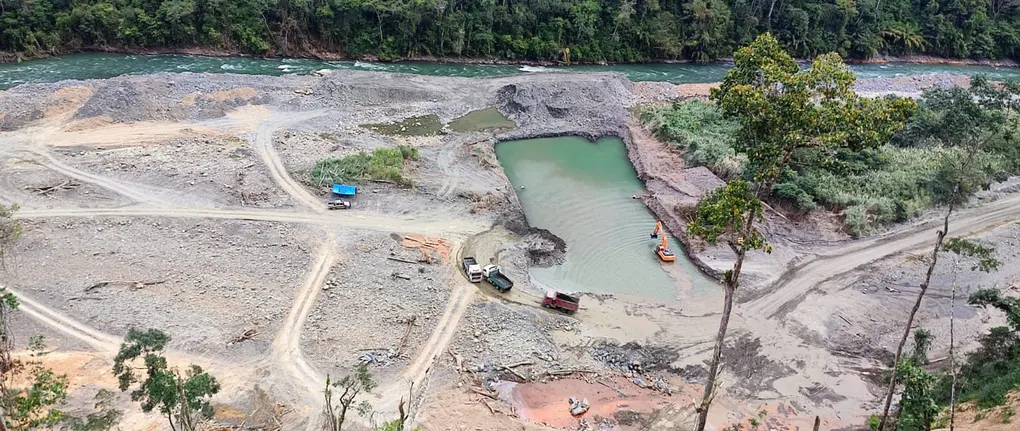Bolivian gold miners push into national park despite country’s green rhetoric
Mining co-ops – with oversize influence in the government – are moving into the Amazon’s Madidi national park
The footage is jerky, perhaps shot covertly. It shows a river running through a jungle: on the far side there is still thick forest, but the near bank is a mess of churned earth and muddy tracks – yet more evidence that gold miners have moved into the Madidi, Bolivia’s most famous national park.
Such mining provides a living for hundreds of thousands of people. But as miners push into the Amazon and other protected areas, the Bolivian government’s support of the industry sits awkwardly with its environmentalist rhetoric.
The economic stakes are vast. Last year, Bolivia exported gold worth $2.5bn, making it the country’s top export. This doubled the figure from 2020, and represented 6.2% of GDP.
Almost all of this production comes not from big mining companies, but from small- and medium-scale operations known as “cooperatives”.
The word “cooperative” is a misnomer, however: these organisations are very often hierarchical. Some are family operations that resemble informal mining enterprises, but others are big businesses in all but name.
What unites them are the privileges they receive from the state, and how they fight to defend them.
Those privileges include low royalties on the gold they mine. In 2020, Bolivia exported $1.25bn of gold and the state received $34m – a tax rate of 2.7%.
Then there is the absence of regulation on the import and use of toxic mercury, which miners use to amalgamate particles of gold.
In December 2021, United Nations rapporteurs accused the Bolivian government of failing to comply with the Minamata convention that controls mercury use.
But Fecoman, the union of gold miners in La Paz, says mercury regulation would jeopardise the employment gold mining provides – and it can mobilise huge numbers to make its point.
“The cooperatives have consolidated as a political power with a tremendous capacity for mobilisation,” said Alfredo Zaconeta, mining expert at Cedla, a Bolivian thinktank. “If the cooperatives decide to march, they stop the country.”
It rarely gets to that stage, though, as the political power of the cooperatives extends to the government itself.
“They have a presence in the legislative power. They have a presence in the executive. They are in the ministries – and they have a vice-minister of cooperative miners,” said Zaconeta.
This influence has helped the cooperatives press for more mining rights – even within Bolivia’s protected areas.
There has long been gold mining north of La Paz, along the so-called “golden route” that skirts the national parks of the Amazon. But now the reserves around boomtowns like Mapiri, Teoponte and Guanay have been depleted, and pressure to move into the parks has grown.

In December 2021, the digital publication Todos Nube revealed that 8% of the Madidi had been granted as mining rights to 140 cooperatives, businesses and individuals.
Such a situation is not uncommon in Bolivia’s protected areas, where environmental legislation is often undercut by extractive rights that supposedly predate it, or unwound by subsequent changes to legislation. Aside from mining, 75% of the Madidi is overlapped with oil and gas concessions.
Only recently, though, have miners moved into the Madidi to start operations.
One park ranger, who asked to remain anonymous, described how the miners make deals with the communities within the park, offering a cut of the gold and sometimes employment or basic infrastructure in return for permission to mine.
The form of mining practiced in the Madidi is either open pit or alluvial. Particulate gold is scattered throughout the earth at a tiny concentration. But the price of gold is such that it is profitable to process a ton of earth for a gram of gold, even with relatively inefficient methods.
In the process, landscapes are transformed.
“I’ve seen such devastation of nature,” said the ranger. “They’ve deforested and dismantled mountains of 100 metres, all in search of this metal.”
The rangers’ ability to monitor the mining, let alone stop it, is limited by their lack of resources and the threat of violence.
In April, Cecilia Requena, an MP from the centre-right Comunidad Ciudadana party, went by river to verify that illegal mining was taking place in the Madidi – and was repelled with stones and dynamite.
Even those who oppose gold mining recognise that, given its social and economic importance, it would be impossible to stop. But they want the state to do something to limit the environmental damage it causes.
That might mean limiting mining rights in protected areas, rooting out activities that are plainly illegal and encouraging the rest to improve their practices, for example recycling the mercury they use.
If the state does not act, some fear more of the country will end up like the boomtown Mapiri, where the worst effects of small-scale mining can be seen.
“Mapiri has become one of the most conflictive zones in Bolivia,” said Jimena Mercado, a journalist who reports on gold mining. “You see the level of violence and you think: is this happening in Bolivia? It seems like those scenes from the Mexican cartels.”
“And where you see illegal gold mining, you see other illegal activities,” Mercado added. “Sexual exploitation of minors, armed groups, drug trafficking – it’s all mixed together. It really is a cancer.”
Neither the government nor Fecoman, the gold miners’ union, responded to requests for interviews.
Publicado en: The Guardian

